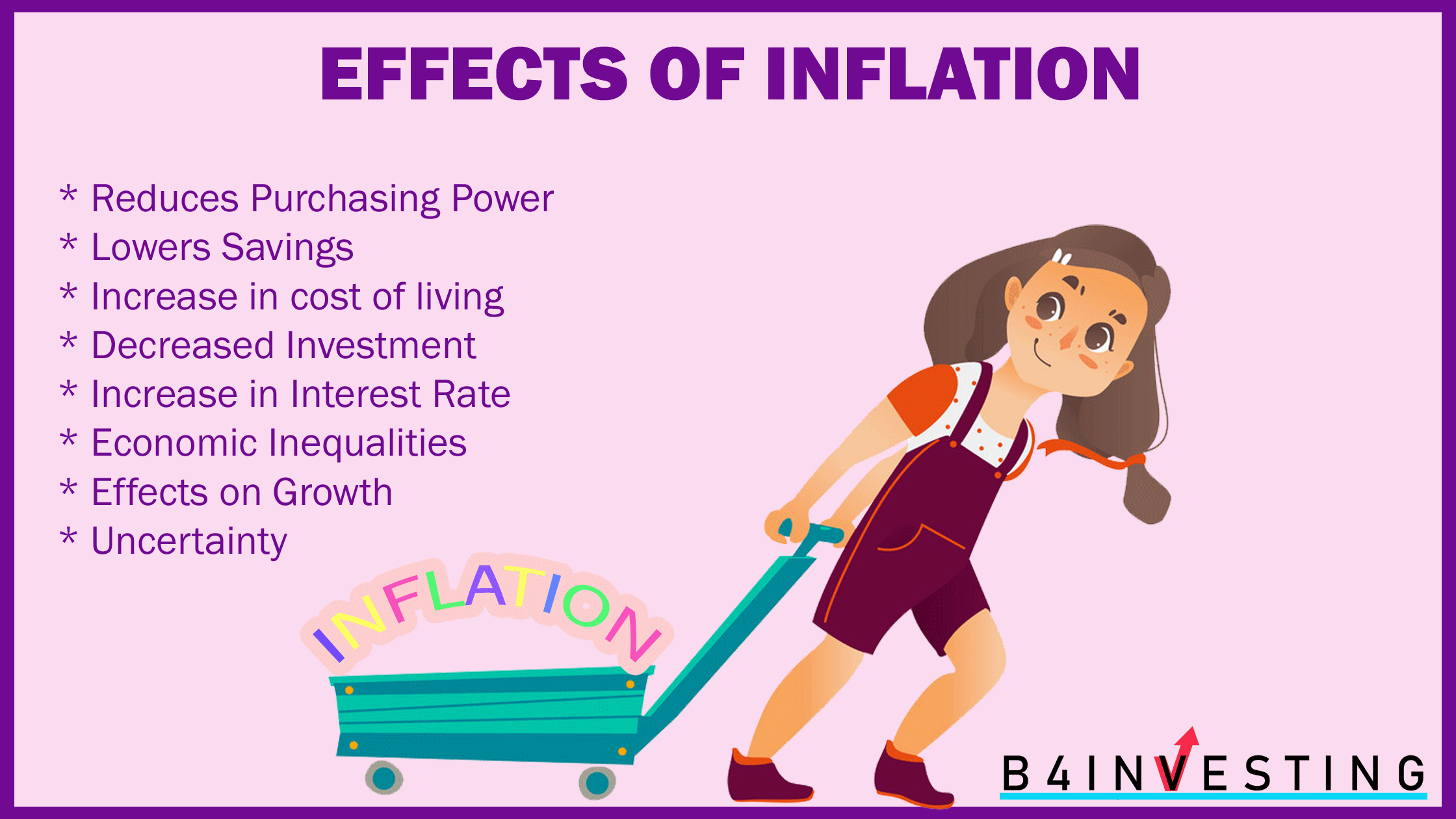
Effects of Inflation
Inflation means the rise in the prices of goods and services of daily or common use, such as food, clothing, housing, recreation, transport, consumer staples, etc. If we bought a bag of goods and services at Rs1000 last year and today it is costing Rs1040 then we say inflation is 4% this year. In short, inflation means change in prices of goods and services.
Usually, inflation is a broad measurement which shows the rise in overall prices or increase in the cost of living for a given period. But it can also be calculated for individual commodities and services.
Inflation affects economy but it doesn’t affect everyone a bad way. Lets discuss the common effects of rising inflation.
Read also: What is Inflation : Everything about Inflation
1. Reduction in Purchasing Power
The immediate common impact of inflation is a reduction in your purchasing power. Purchasing power means the number of goods and services one can buy with a currency unit. When inflation rises and income doesnt rise according to inflation, a person has to spend more money to buy the same quantity of products or services which limits purchasing power.
For example, rate of petrol in 1989 was Rs. 8.50 and now in 2022, a customer has to pay approximate Rs 106 for a liter. The higher price indicates 33 years of steep inflation.
2. Lower Savings
When price levels increase, money loses its value as a person has to spend more to buy goods and services. When a person is spending more money then automatically the savings get affected.
Savings is also essential as a person needs savings when emergencies come like health problems, loss in businesses, etc. When such emergencies come and if a person doesn’t have money then life comes in difficulty.
Read also: Gold Investment: Pros and Cons of Investing in Gold
3. Increase in Cost of Living
As the cost of living things increase, a person has to pay more money from his/her income to continue same lifestyle. If salary doesn’t increase in proportion of inflation, a person has to pay more for basic necessities too. This is true for retirees who have fixed salary. As salary is fixed and cost of day to day essentials is increasing.
Also Read: Best Investment Options for Senior Citizens
4. Decreased Investment
In todays world, a person needs lot of money for education of children, marriage of children, health emergencies, etc. Only salary is not enough to maintain lifestyle along with so many expenses of education, health, buying a new house, etc. People have started investing money to earn extra income and do future planning for retirement and marriage, education of children, buy a house, etc. High inflation can affect these investments. Investors may not want to put money into an investment that is not likely to provide a return that keeps up with inflation. The poor people cant buy assets like property which has traditionally served as inflation hedge.
5. Increase in Interest Rate
When inflation rate increases, the Reserve Bank of India (RBI) increases the interest rates for deposits and loans. Raising interest rates has been a tried and tested monetary policy to handle inflation.
When there’s high inflation, central banks increase interest rates to discourage borrowing and control the surging prices. As interest rates rise, people save more by cutting back on expenses.
6. Economic Inequalities
People who earn low suffer the most during period of high inflation. They have to spend a larger proportion of their income on basic necessities like food, fuel, health, housing, and other due to price increment.
On the other hand, rich wealthy people who own assets such as stocks, real estate, or gold reap the benefits of inflation. Since these asset prices increases with the inflation rate, the owners earn high returns and become wealthier.
So, poor people have to spend more just to survive and the rich people earn profits and earn more, fueling economic inequality.
7. Effects on Growth
Low inflation promotes economic growth, but a rapid inflation disturbs economic growth as it raises cost of development projects. High inflation reduces purchasing power if income does not rise with income. If prices rise faster than income then both savings and investments get discouraged leading to slow down of economic growth.
Read also: Strength of Currency
8. Uncertainty
Finally, high inflation can lead to uncertainty in the economy, as people may become unsure of the value of money. This can lead to a lack of consumer confidence, which can further hurt the economy.
Takeaway:
Rapid inflation is an unstable situation. It creates uncertainty. Society gets disturbed as prices of goods which we need in day to day life increase and salaried people demand increase in wages. If their salaries are not increased then it affects their lifestyle, saving pattern, investment, etc.
The middle-class people suffer more as the real value of their income becomes very low. Inflation also creates inequality by making one class of people richer and the other poorer. Inflations disturbs the economic growth.

